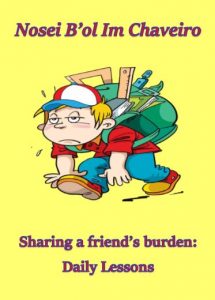
A Daily Schedule to Study Nosei B’ol Im Chaveiro
FEELING OUR FRIEND’S BURDEN AND PAIN AS IF IT WERE OUR OWN
The Mishna in Pirkei Avos (6:6) lists forty-eight (48) behaviors and qualities that are instrumental for Torah acquisition. One of them is the ma’alah (virtue) of “Nosei B’ol Im Chaveiro” – carrying (i.e., sharing) his fellow’s burden. The famed Mirrer Mashgiach and Mussar personality, Rav Yeruchem Levovitzdefines Nosei B’ol Im Chaveiro as feeling our friend’s burden and pain as if it were our own, being together with him or her in a time of need. (Henceforth, the phrase “the ma’alah or middah of Nosei B’ol Im Chaveiro” will often be shortened to “Nesiah B’ol,” denoting sharing someone’s feelings).
Rav Chaim Friedlander explains when we are Nosei B’ol Im Chaveiro, we give someone a piece of our very being by projecting ourselves into his or her situation to share (i.e., experience) their feelings. Therefore, the benefits of Nesiah B’ol surpass the relief rendered by providing goods and services (i.e., Tzedaka and Chesed). He adds, “The essence of Nosei B’ol is not to reduce or remove the other person’s suffering, but rather, to be with him in his distress and to feel his pain, to share in his suffering even if we are unable to tangibly help him.” The message we convey is: “We are with you; you are not alone in your struggles.”
A reasonable English translation of Nosei B’ol Im Chaveiro is “empathy,” which is defined by Rabbi Lord Jonathon Sacks as: “Seeing the world through someone else’s eyes, entering into their feelings and acting in a way as to let them know they are understood, they are heard and that they matter.” Whether people are struggling through a personal crisis, exerting themselves to study Torah or working hard to arrange their Shul’s annual dinner, the common essential need we all have is to know that we matter and that our experiences, efforts and feelings actually register on another person’s heart. Thus, being Nosei B’ol Im Chaveiro not only validates my friend’s experiences and emotions, but perhaps more importantly, it affirms that his or her existence and place in this world, are needed and valued.
The introduction to Sefer Nefesh HaChaim was written by Rebbi Yitzchok of Volozhin, the son of this classical work’s author, Rebbi Chaim of Volozhin. Rebbi Yitzchok extolls the sublime character of his illustrious father. Among the many noble virtues mentioned, Rebbi Yitzchok writes that throughout his father’s life, he “gave of his soul” to revive the spirit of the downtrodden with his encouraging, comforting words and his generous financial support, bringing joy and relief to the destitute. Even on his deathbed, wracked with pain and suffering from his illness, his thoughts remained focused on the Jewish people’s suffering. Rebbi Yitzchok writes, “He would rebuke me, saying that he observed I did not share in the pain of others. His constant reminder to me was: ‘This is the entire essence of a person – one is not created for himself, but to help others in every possible way.’”
Download Daily Lesson Booklet on Nosei B’ol Im Chaveiro in WORD
Download Daily Lesson Booklet on Nosei B’ol Im Chaveiro in PDF



















